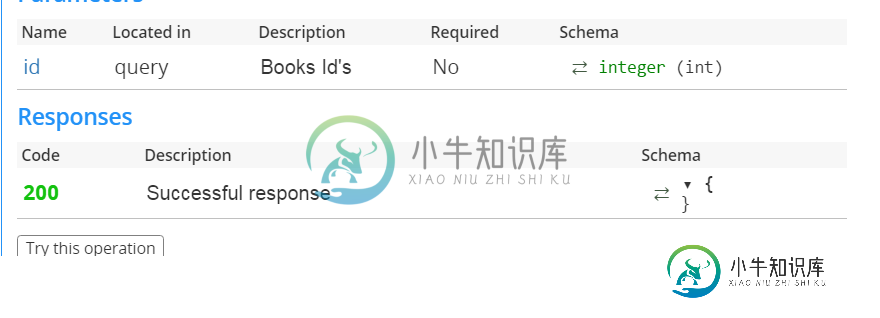swagger 2.0中JSON对象的模式类型是什么
我正在Swagger 2.0的帮助下编写一个API文档。我已经生成了一个API,其中响应在一系列书籍中,运行良好。
[{
"id": 1,
"book_name": "The Complete Reference Java8",
"author": "Herbert Schidt",
"genre": "Technology"
}, {
"id": 2,
"book_name": "C Programming",
"author": "Dennis Ritchie",
"genre": "Technology"
}]
大摇大摆
/fetchBooks:
get:
description: |
Returns an array of book objects.
responses:
200:
description: Successful response
schema:
title: ArrayOfBooks
type: array
items:
type: object
properties:
id:
type: integer
book_name:
type: string
author:
type: string
genre:
type: string
好吧,我只想在JSONObject中的一个API中发送一本书的详细信息,当我尝试对象不起作用时,我应该采取什么模式类型。
{
"id": 1,
"book_name": "The Complete Reference Java8",
"author": "Herbert Schidt",
"genre": "Technology"
}
大摇大摆
/fetchBook:
get:
description: |
Returns a book object
parameters:
- name: id
in: query
description: Books Id's
reqrequired: true
type: integer
format: int
responses:
200:
description: Successful response
schema:
type: object <-- What type should I specify for JSONObject here
items:
type: object
properties:
id:
type: integer
book_name:
type: string
author:
type: string
genre:
type: string
由于对象不工作,swagger不显示JSON格式。
当前状态:

预期状态:

共有2个答案
提示:如果要在多个操作中重复使用同一架构-例如,有一本书和一个书,您可以在定义部分定义该架构,并在其他地方定义它。
paths:
/fetchBooks:
get:
...
responses:
200:
description: Successful response
schema:
$ref: '#/definitions/ArrayOfBooks' # <--------
/fetchBook:
get:
...
responses:
200:
description: Successful response
schema:
$ref: '#/definitions/Book' # <--------
definitions:
Book:
type: object
properties:
id:
type: integer
book_name:
type: string
author:
type: string
genre:
type: string
ArrayOfBooks:
type: array
items:
$ref: '#/definitions/Book' # <--------
此外,如果这是一个正在开发的新API,而不是现有API,那么GET/fetchBooks中的“fetch”是多余的(GET=fetch)。考虑放弃“fetch”,只使用GET/book和GET/book?id=
。
/fetchBook:
get:
description: |
Returns a book object
parameters:
- name: id
in: query
description: Books Id's
required: true
type: integer
format: int
responses:
'200':
description: Successful response
schema:
type: object
properties:
id:
type: integer
book_name:
type: string
author:
type: string
genre:
type: string
您遇到的问题是必填字段中有一个拼写错误
fallowing是单对象响应的正确语法
-
问题内容: 我对Python 3中的和类有些困惑。也许有人可以消除我的困惑或提供一些其他信息。 我目前的理解是,每个类(除外)都从称为的基类继承。但是每个类(包括)也是该类的一个实例,它是自身的实例,并且也从继承。 我的问题是: 是否有一个原因/设计决策,为什么是的实例并从中继承?对象的/ class是否也可以是对象本身? 类()如何成为其自身的实例? 哪一个是真正的基类或? 我一直认为这将是最“
-
我想把下面的json对象存储到postgresql数据库中。 你能告诉我在PostgreSQL中应该使用什么数据类型吗?提前谢了。
-
问题内容: Selenium WebDriver中的页面对象模式是什么? 它的用途是什么?我们如何在Selenium WebDriver中使用它? 示例将不胜感激。 问题答案: 文档已经涵盖了这一点。如果您有任何具体问题,请随时编辑您的主要帖子。 官方: Selenuim Wiki上的页面对象和PageFactory。 Selenium官方网站上的页面对象设计模式。 非官方的: 进行Google搜
-
问题内容: 我的项目中有一些模型类,例如,等等,它们具有多个字段及其setter-getter方法,我需要 通过套接字 与客户端和服务器之间 来回交换这些类的对象作为JSONObject 。 有什么方法可以直接从模型类的对象创建,以使对象的字段成为键,而该模型类对象的值成为此JSONObject的值。 例: 我创建JSON对象为: 这让我有点像: 请注意,在我的某些模型类中,某些属性本身 是其他模
-
我知道number包括integer,但我可以明确定义一个“type”:“integer”。我是说这会违反规范吗?

